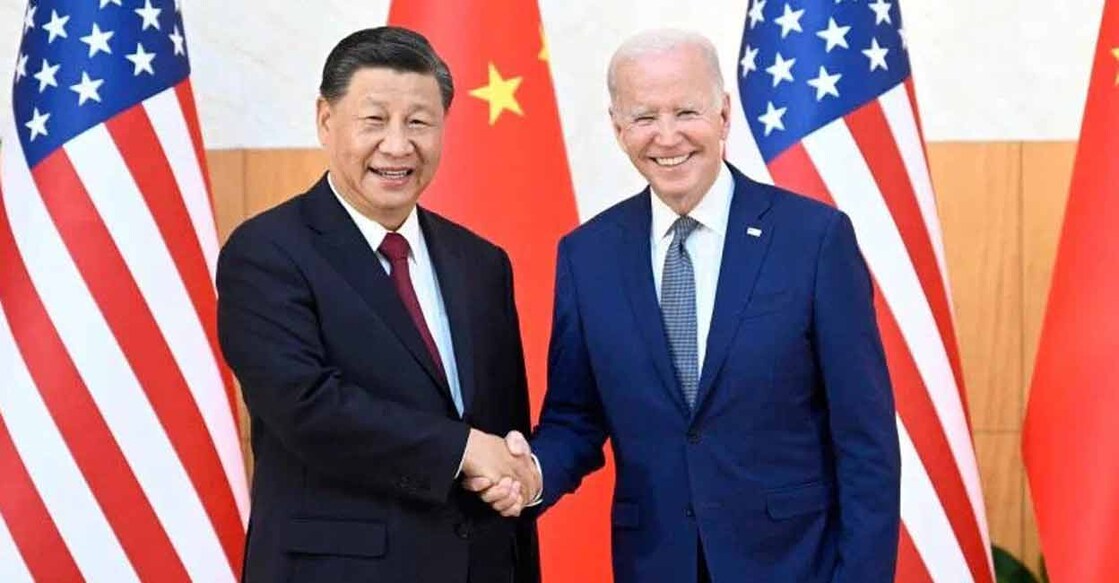Biden meets Xi in Bali; China, US agree to reopen communication to avoid conflict

Mail This Article
Bali: US President Joe Biden and his Chinese counterpart Xi Jinping on Monday held their first face-to-face meeting here with both leaders agreeing on the need to manage their differences and prevent a conflict, amid Beijing's coercive military posturing against Taiwan and in the strategic Indo-Pacific region.
The high-profile meeting between Biden and Xi that lasted nearly three hours took place on the margins of the G20 summit here in this Indonesian city. Both leaders, without their masks, shook hands and greeted each other with smiles, standing in front of a row of US and Chinese flags.
This is their first in-person meeting after Biden became president in 2021. But they have talked over phone to keep the bilateral ties from derailing.
In his opening remarks, Biden said that he was committed to keeping the lines of communication open with Xi.
Dialogue between the two countries was suspended in August, when Beijing cancelled dialogue across a number of areas in retaliation for US House Speaker Nancy Pelosi's visit to Taiwan. After Pelosi's visit, China held a series of provocative live military exercises around Taiwan to make its concerns clear.
Both sides have expressed fears of the potential consequences of a misunderstanding.
"I'm committed to keep lines of communication open between you and me personally, but our governments across the board, because our two countries have so much that we have the opportunity to deal with, he said.
"As the leaders of our two nations share responsibility in my view to show that China and the US can manage our differences, prevent competition from becoming anything even near conflict and find ways to work together on urgent, global issues that require our mutual cooperation," he added.
On his part, Xi said the world is paying attention to the high-stakes meeting between him and President Biden.
"Currently the China-US relationship is in such a situation that we all care a lot about it because this is not the fundamental interest of our two countries and peoples, and it is not what the international community expects (from) us," Xi said.
"As leaders of the two major countries we need to chart the right course for the US China relationship. We need to find the right direction for the bilateral relationship going forward and elevate the relationship, he added, speaking through a translator.

"The world expects that China and the United States will properly handle the relationship. Our meeting has attracted the world's attention, so we need to work with all countries to bring more hope to world peace, greater confidence to global stability and strong impetus to common development," Xi said.
Addressing a press conference after the bilateral meeting, Biden said he did not interpret any "imminent attempt" by China to invade Taiwan.
China views Taiwan, a self-governing island, as a rebel province which should be reunited with the Chinese mainland, even by force.
Biden said in their talks, he made clear the US policy toward Taiwan had not changed, despite saying four times ahead of the talks the US would defend Taiwan militarily if China attacked it.
"I made it clear that we want to see cross-strait issues peacefully resolved, so it never has to come to that," Biden said of any potential conflict over Taiwan.
"I'm convinced that that he understood exactly what I was saying," Biden said of the conversation on Taiwan.
On his part, Xi told Biden that the Taiwan question is at the very core of China's core interests, the bedrock of the political foundation of China-US relations, and the "first red line that must not be crossed" in their bilateral ties.

Later, the White House said Biden and Xi spoke candidly about their respective priorities and intentions across a range of issues.
"President Biden explained that the United States will continue to compete vigorously with the People's Republic of China, including by investing in sources of strength at home and aligning efforts with allies and partners around the world.
"He reiterated that this competition should not veer into conflict and underscored that the United States and China must manage the competition responsibly and maintain open lines of communication," the White House readout said.
The two leaders discussed the importance of developing principles that would advance these goals and tasked their teams to discuss them further. .
Biden said these countries and the US can together defend against threats to rules-based order and threats against the rule of law a reference to China but without naming Beijing's aggressive actions in the Indo-Pacific region.
China claims nearly all of the disputed South China Sea, though Taiwan, the Philippines, Brunei, Malaysia and Vietnam all claim parts of it. Beijing has built artificial islands and military installations in the South China Sea. China also has territorial disputes with Japan in the East China Sea.
The South China Sea and the East China Sea are stated to be rich in minerals, oil and other natural resources. They are also vital to global trade.
Although the US lays no claims to the disputed waters, it has challenged China's growing territorial claims in the South China Sea by deploying warships and fighter jets to assert freedom of navigation and overflight patrols in the strategically vital region.
Both Biden and Xi entered the meeting -- held at a hotel in Bali's Nusa Dua -- stronger at home.
Biden's Democratic Party has done better than expected in mid-term elections, and Xi has secured a tradition-breaking third term as the head of China's Communist Party and is being placed by many in the same league as Deng Xiaoping.
His circumstance has changed, to state the obvious, at home, Biden was quoted as saying to reporters before his Bali arrival.
And about his own, he said, "I know I am coming in stronger."

